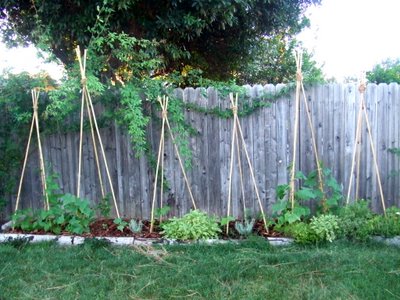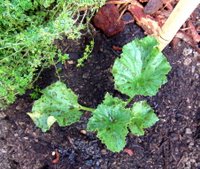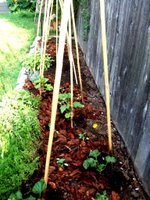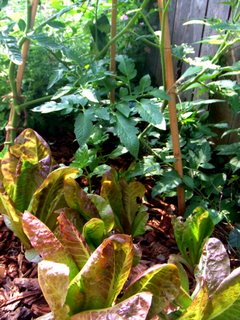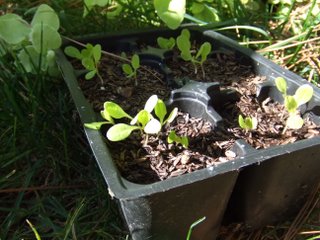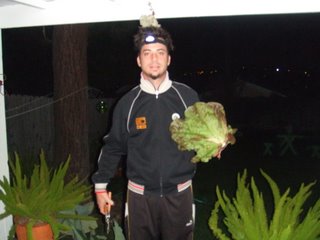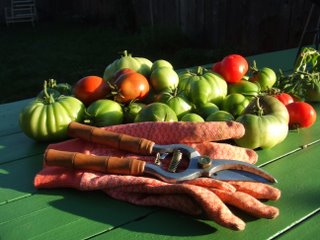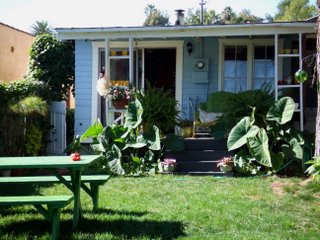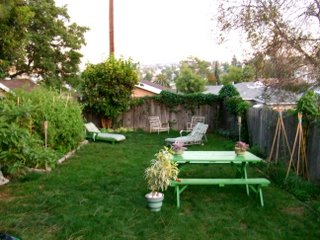
Ever heard the expression "Plant a $1 plant in a $5 hole" ? Absofreakinglutely true! Especially when it comes to planting your precious veggies and anything that bears fruit and flowers. So don't be cheap and lazy, people- ammend your soil! I know it's a pain in the a** to drag a big bag of compost or soil amendment from the car to your yard. I know. I know how the lazy mood strikes and you're just not in the mood to get dirt all over the car and on your clothes. I know. And I know that's it's like "ouch" when you end up shelling out like 28 bucks for like three bags of Bumper Crop. Believe me, I know. I know and I hear you, and if you were here right now I'd give you a big hug and we could drink rioja and talk for hours about this and at the end of the night we'd be best friends. I'd hug you and tell you why building up a healthy soil is the most important thing you can do for the health of the plant. I'd pour you another glass of rioja,
bum a cigarette off of you, look deep into your eyes, and tell you that a healthy soil is the foundation of a healthy organic garden. That feeding the microorganisms in the soil and building up a good earthworm population was an act of love. That building a healthy soil was akin to having a healthy diet- and that it was the pillar of good health. I'd stroke your cheek, pull the hair away from your forehead and whisper gently that you should amend your soil at planting time and mulch with compost or amendment throughout the season. That having a healthy soil could ward off pests and disease and reduce stress for your plants. And that it could only be accomplished by amending your soil with organic matter. I suggest
BUMPER CROP soil amendment.
Let me tell you why you should ammend your soil :1-Don't be lazy! Carrying 2 cubic foot bags of compost builds muscle! It's like free exercise! Have you taken a look at your
panza lately? Trust me, you ain't getting any younger and you need all the help you can get, my friend!
2-Adding organic matter to the soil every time you cultivate it makes it easier for you to dig and work through your brick hard clay soil in the future, especially if you are planting vegetables. Make a luxurious soil and
INCREASE IT'S WORKABILITY! (I'm appealing to your laziness first)
3-When you add organic matter to the soil, you
INCREASE THE SOIL'S CAPACITY TO HOLD WATER. The little bits of organic matter will hold moisture and make it available over a longer period of time than pure clay or sandy soils.. This is very important for the health of your soil and the plant- and you get to
WATER LESS, which is especially important with sandy soils which retain very little water.
4- Regardless of whether you have a clay soil, or perhaps live near the beach and have a sandy soil, amending your soil will improve the structure of your soil. It will help sandy soils retain nutrients and moisture and will improve aeration and compaction in clay soils, loosening them up and making their fertility and nutrients more readily available, and, very important for clay soils -
IMPROVES DRAINAGE. Ultimately, you are
IMPROVING IT'S PHYSICAL STRUCTURE. The plant's roots will love you...
5-
COMPOST ADDS IMPORTANT NUTRIENTS TO YOUR SOIL. Compost and soil amendments contain many micronutrients that you cannot get from traditional fertilizers.
6- A soil high in organic matter will help
ATTRACT EARTHWORMS. They love a good soil rich in organic matter. Earthworms in the soil help increase aeration and irrigation through their tunneling, improve soil quality as they digest soil and produce nutrient rich castings. Earthworms are your friends. Invite them to that party in your soil, baby!
7- Organic matter in the soil will help
FEED AND ENCOURAGE BENEFICIAL MICROORGANISM POPULATIONS. These beneficial soil microorganisms include bacteria, protozoa, actinomycetes, and fungi. All these miniscule critters help decompose organic matter and help form humus, as well as help plant roots extract nutrients from the soil. If you are used to feeding your plant with chemical, water soluble fertilizers (which you should stop doing right this second), this will naturally help your plant reduce it's dependency.
ASSORTED NOTES: A-
AVOID AMENDMENTS AND PLANTING MIXES WITH SEWAGE SLUDGE IF YOU ARE PLANTING EDIBLES! . Sewage sludge is basically composted human shit, and contains a lot of heavy metals that could end up in your vegetables, fruits and edible flowers. While appropriate for ornamentals, I wouldn't use it on edibles. By the way, not to gross you out, but most conventionally grown produce is grown with composted sewage sludge...another reason to grow your own organic produce or buy organic.
B-
BEWARE OF CHEAP COMPOST- SOME OF IT IS STILL "HOT"! That means the carbon/nitrogen chemical reaction has not fully finished and there is still excess nitrogen. Excess nitrogen can burn your plants, similar to what happens if you overfertilize with nasty chemical fertilizers. The bag of cheap compost may smell like ammonia, and might actually feel hot. Let this bag settle for a week or longer in a quiet place and come back to it later when the carbon/nitrogen reaction has completed and the compost has fully decomposed. Trust me on this one- I once spread some cheap compost from a large discount chain on my plants and because it was so "hot", the excess nitrogen burned the foliage on ALL my plants. I was devastated- all my plants were "burnt".
C-
NEVER EXCEED THE RATIO OF 50% NATIVE SOIL AND 50% AMENDMENT AT A TIME. Amend the soil every time you disrupt the earth, (for example to cultivate the soil because you are adding a new crop) but never stray from this ratio. The soil you create will be too rich for the plant- better to add a little every time you plant.
D-I really suggest getting the good stuff- don't cheap out when it comes to ammendment. I suggest
BUMPER CROP SOIL AMENDMENT found at any good nursery- it comes in a 2 cubic foot bag.
E-Don't get crazy when amending the soil for
NATIVE PLANTS. Amend a little when you plant, depending on what the species desires, but keep in mind that most native plants would rather be mulched than have their soil structure and microorganism relationship disrupted. Also, many native plants actually prefer a thin, un-enriched, pure native soil. Let the earthworms do the work for you- the one time you get to be lazy in the garden.
Is that too confusing?? Hope not!
